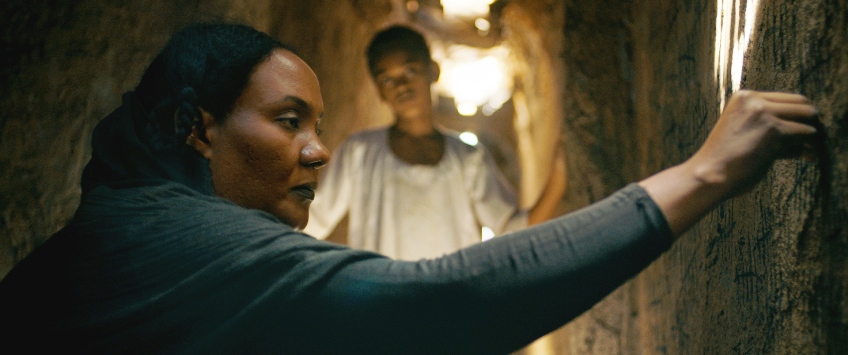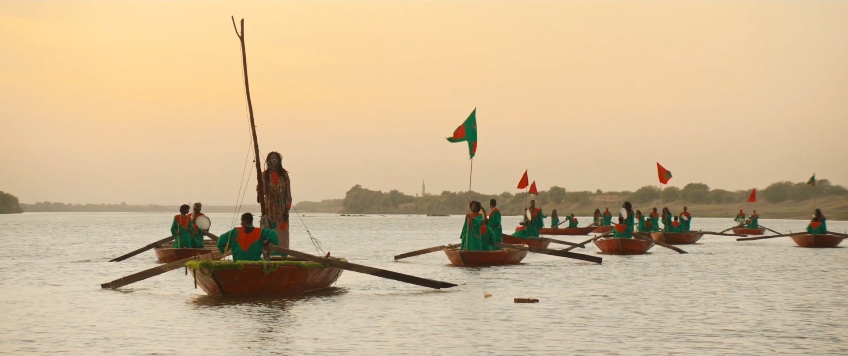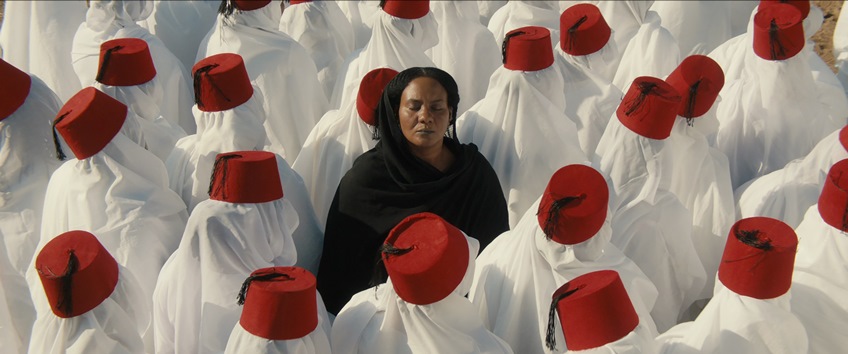Joyce Glasser reviews You Will Die at Twenty (November 12, 2021) Cert 12A, 104 mins.
Sudanese writer-director Amjad Abu Alala’s film opens with a shot of a buzzard nibbling at the carcass of a camel in a sweltering desert, with a more joyful procession in the background. We are watching the equivalent, in the regional religion of Sufism, of a baptismal procession, representing the cycle of birth, life and death. But for mother, Sakina (Islam Mubarak), father Alnoor (Talal Afifi) and baby Muzamil, named after the prophet, there is only death. As Sakina approaches the sheik to bless her only child at a noisy ritual, a hallucinating dervish collapses at the count of age 20 and the boy’s fate is sealed.
Though he spent much of his life in Dubai, 37-year-old Abu Alala has only known the repressive dictatorship of Al-Bashir and spent five of his formative teenage years in Sudan where he discovered cinema as an outlet for his creativity and means of escape from regime’s stranglehold.
Al-Bashir who hosted Osama bin Laden in the Sudan and was indicted by the International Criminal Court for genocide in Darfur is the elephant in the room here. This potent fable, based on a banned short story, Sleeping at the Foot of the Mountain by the late Hammour Ziada, marks a promising debut feature from Abu Alala but suffers from pacing and tension in its dramatic narrative.

Living under the sign of death has early consequences for Muzamil (the radiant, angelic Moatasem Rashed) whose mother, a seamstress, makes marks on the dirt wall of a conical shaped bedroom to chart her son’s fate. Muzamil quickly loses his father when Alnoor admits to Sakina that he lacks her strength to cope. Off he goes for 19 years to seek work in Addis Ababa, and all points beyond, sending money home. Growing up without a father, and a defeated mother is made worse when Muzamil is bullied by the village kids, who call him “son of death.” As his mother sees no point in sending him to school, he is unlikely to make friends.
Muzamil’s only companion is Naima, (Asjad Mohamed) a childhood sweetheart who, when she grows into a positive-minded, lovely teenager (Bonna Khalid) becomes assertive enough to tell Muzamil that she loves him. She warns the shy boy that her family want to marry her off to another, as she talks to Muzamil about raising a family on the banks of the Nile, a river he fears as his uncle drowned in it, but a river whose metaphorical meaning is obvious.
Sakira is eventually persuaded by the Iman to send Muzamil to school, but his education there is limited to learning to memorise and recite the Qur’an in two dialects, at which he excels. Audiences might be thinking of how the curriculum in Afghanistan is being similarly restricted by the new Taliban government. Along with his “schooling”, Muzamil (now played by Mustafa Shehata) works at the village shop.

It is while delivering a secretive item from the shop that Muzamil meets the man who will become not only a father figure, but a real teacher to him. “The foreigner,” Sulaiman (Mahmoud Alsarrai) has travelled the world as a photographer and filmmaker and, in poor health, has retired with his female companion in the village.
When Muzamil discovers that the secret package is alcohol, he is disgusted, but, intrigued with the stranger, his return visits become longer and longer. Sulaiman teaches Muzamil basic maths (he can count his age on the dirt wall), to operate the film camera and projector, and shows him the world through images. We see a clip from a Jadallah Jubarra film of western-dressed people dancing in a club in Khartoum, shot prior to Al-Bashir’s military coup in 1989.
Adult Muzamil, played by Mustafa Shehata, fails to convey to the audience his thoughts about discovering a world beyond his village, and Abu Alala, writing the script with Yousef Ibrahim, does not help him by providing more than a brief scene to capture these experiences. Muzamil’s determination to become a man by experiencing sex before he dies are more disturbing than an innocent boy’s bungling, and do not seem in keeping with what he might have learned from Sulaiman, if their discussions included this right of passage.
The film is an indictment of the repressive forces of religion and culture, in this case, magnified by a political regime that uses religion, like the Catholic Church in the Middle Ages, to keep large populations under control, depriving them of free will or opportunities beyond their preordained stations. Al-Bashir’s control over his people is akin to Vladimir Putin’s and other leaders who use not only religion, but the internet, fake news, fear and attempts to eliminate political opposition to manipulate millions of people.




